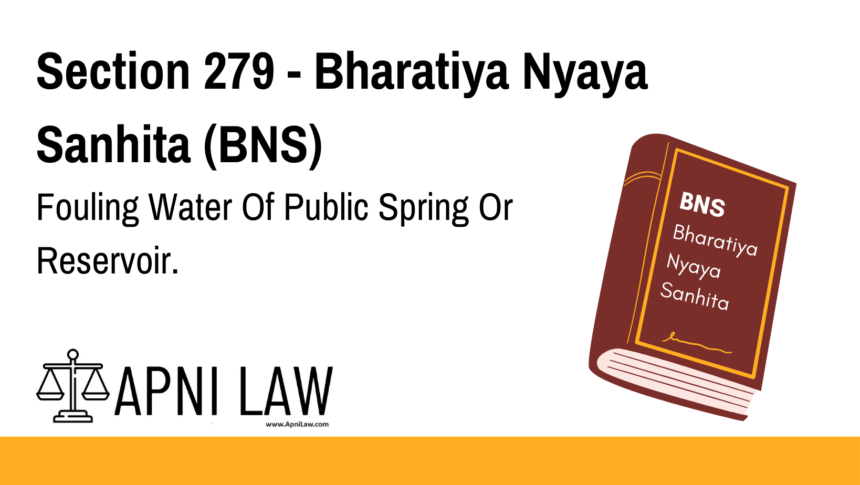Code: Section 279 BNS
Whoever voluntarily corrupts or fouls the water of any public spring or reservoir,
so as to render it less fit for the purpose for which it is ordinarily used, shall be punished with
imprisonment of either description for a term which may extend to six months, or with fine
which may extend to five thousand rupees, or with both.
Explanation of Section 279 BNS
Section 279 of the Bharatiya Nyaya Sanhita (BNS), 2023 deals with the offense of intentionally contaminating or fouling the water of public springs or reservoirs. This provision is crucial for maintaining public health, as clean water is essential for drinking, sanitation, and other daily needs.
Key Features:
- Offense: Intentionally contaminating public water sources.
- Public Interest: Protects water bodies used by the general public.
- Punishment: Imprisonment up to six months, a fine up to ₹5,000, or both.
Illustration of Section 279 BNS
- Dumping Waste in a Public Reservoir:
Ravi, a construction worker, dumps hazardous chemicals into a public reservoir, making the water unsafe for drinking and daily use. - Polluting a Public Spring:
Anita intentionally releases industrial waste into a public spring, affecting the health of those who rely on it for drinking water. - Contaminating Water for Personal Gain:
Kiran adds harmful substances to a public water tank to drive people toward purchasing bottled water from her shop.
Common Questions About Section 279 BNS
1. What is considered “fouling” the water?
- Answer: Any act that contaminates water, such as dumping chemicals, waste, or substances that make it unsafe for public use.
2. Does this apply to both intentional and accidental contamination?
- Answer: No, the section specifically applies to voluntary or intentional acts of contamination.
3. What are the penalties under Section 279?
- Answer: Imprisonment up to six months, a fine up to ₹5,000, or both.
4. Can a person be charged if they unintentionally pollute public water?
- Answer: No, the offense requires deliberate action. Accidental contamination may fall under other environmental laws.
5. Who can be prosecuted under this section?
- Answer: Anyone who intentionally fouls public water sources, including individuals and corporate entities.
Conclusion
Section 279 of the Bharatiya Nyaya Sanhita (BNS), 2023 emphasizes the importance of protecting public water sources from intentional contamination. This provision aims to safeguard public health and ensure access to clean, safe drinking water for all. It holds individuals accountable for actions that could harm the community’s well-being.
For more legal insights, visit ApniLaw.








